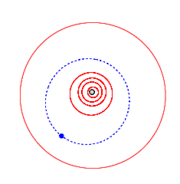9903 Leonhardt
9903 Leonhardt, provisional designation 1997 NA1, is a dark asteroid from the outer region of the asteroid belt, approximately 10 kilometers in diameter.
 Orbit of Leonhardt (blue), with the inner planets and Jupiter (outermost) | |
| Discovery [1] | |
|---|---|
| Discovered by | P. G. Comba |
| Discovery site | Prescott Obs. |
| Discovery date | 4 July 1997 |
| Designations | |
| (9903) Leonhardt | |
Named after | Gustav Leonhardt (conductor and harpsichordist)[2] |
| 1997 NA1 · 1976 UG6 | |
| main-belt [1][3] · (outer) | |
| Orbital characteristics [1] | |
| Epoch 4 September 2017 (JD 2458000.5) | |
| Uncertainty parameter 0 | |
| Observation arc | 40.43 yr (14,767 days) |
| Aphelion | 3.8232 AU |
| Perihelion | 2.3527 AU |
| 3.0880 AU | |
| Eccentricity | 0.2381 |
| 5.43 yr (1,982 days) | |
| 240.21° | |
| 0° 10m 53.76s / day | |
| Inclination | 1.6903° |
| 195.95° | |
| 139.13° | |
| Physical characteristics | |
| Dimensions | 8.499±0.240 km[4] 17.8 km[5] |
| 0.042±0.008[4] | |
| 14.5[1] | |
The asteroid was discovered on 4 July 1997, by American amateur astronomer Paul Comba at Prescott Observatory in Arizona, United States.[3] It was named after Dutch keyboard player Gustav Leonhardt.[2]
Orbit and classification
Leonhardt orbits the Sun in the outer main-belt at a distance of 2.4–3.8 AU once every 5 years and 5 months (1,982 days). Its orbit has an eccentricity of 0.24 and an inclination of 2° with respect to the ecliptic.[1]
It was first identified as 1976 UG6 at Kiso Observatory in 1976, extending the body's observation arc by 21 years prior to its official discovery observation at Prescott.[3]
Physical characteristics
Diameter and albedo
According to the surveys carried out by the Infrared Astronomical Satellite IRAS and NASA's Wide-field Infrared Survey Explorer with its subsequent NEOWISE mission, Leonhardt measures 17.8 and 8.499 kilometers in diameter, respectively.[4][5] WISE/NEOWISE also gives an albedo of 0.042 for the body's surface.[4] It has an absolute magnitude of 14.5.[1]
Lightcurves
As of 2017, the asteroid's rotation period and shape remain unknown.[1][6]
Naming
This minor planet was named for Gustav Leonhardt (1928–2012), a Dutch conductor and harpsichordist, who founded the Leonhardt Baroque Ensemble. He was known for his many international concert tours and for his large number of recorded baroque works.[2] The official naming citation was published by the Minor Planet Center on 2 April 1999 (M.P.C. 34356).[7]
The main-belt asteroid 12637 Gustavleonhardt, discovered during the second Palomar–Leiden Trojan survey campaign in 1973, is also named in his honor.[8]
References
- "JPL Small-Body Database Browser: 9903 Leonhardt (1997 NA1)" (2017-03-28 last obs.). Jet Propulsion Laboratory. Retrieved 22 June 2017.
- Schmadel, Lutz D. (2007). "(9903) Leonhardt". Dictionary of Minor Planet Names – (9903) Leonhardt. Springer Berlin Heidelberg. p. 712. doi:10.1007/978-3-540-29925-7_7742. ISBN 978-3-540-00238-3.
- "9903 Leonhardt (1997 NA1)". Minor Planet Center. Retrieved 17 March 2017.
- Masiero, Joseph R.; Mainzer, A. K.; Grav, T.; Bauer, J. M.; Cutri, R. M.; Dailey, J.; et al. (November 2011). "Main Belt Asteroids with WISE/NEOWISE. I. Preliminary Albedos and Diameters". The Astrophysical Journal. 741 (2): 20. arXiv:1109.4096. Bibcode:2011ApJ...741...68M. doi:10.1088/0004-637X/741/2/68. Retrieved 17 March 2017.
- Tedesco E.F.; Noah P.V.; Noah M.; Price S.D. "The supplemental IRAS minor planet survey (SIMPS)".
- "LCDB Data for (9903) Leonhardt". Asteroid Lightcurve Database (LCDB). Retrieved 17 March 2017.
- "MPC/MPO/MPS Archive". Minor Planet Center. Retrieved 17 March 2017.
- "12637 Gustavleonhardt (1053 T-2)". Minor Planet Center. Retrieved 17 March 2017.
External links
- Asteroid Lightcurve Database (LCDB), query form (info)
- Dictionary of Minor Planet Names, Google books
- Asteroids and comets rotation curves, CdR – Observatoire de Genève, Raoul Behrend
- Discovery Circumstances: Numbered Minor Planets (5001)-(10000) – Minor Planet Center
- 9903 Leonhardt at AstDyS-2, Asteroids—Dynamic Site
- 9903 Leonhardt at the JPL Small-Body Database
